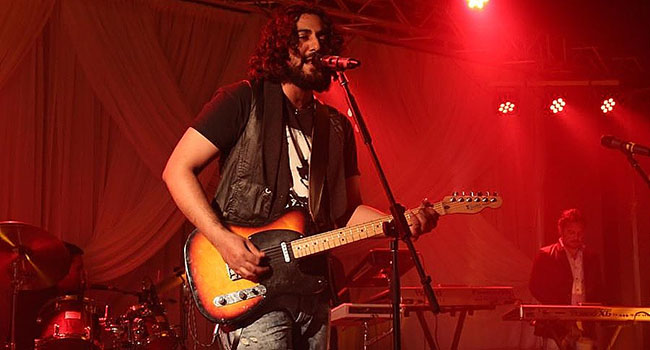
Music has a major role to play in the fight against systemic racism, according to newly minted music PhD Arsh Khaira.
The Edmonton-based musician and University of Alberta instructor, who graduated on June 12, wrote his thesis on how the trauma of ethnic conflict is passed down through generations. He focused specifically on the ways in which Sufi music helped heal divisions after the partition of India and Pakistan in 1947.
“Music allowed communities in East and West Punjab – primarily Sikhs and Muslims, respectively – to enter into a shared psychological and spiritual head space that resonated with the relationships they shared prior to colonization,” he explained.
More broadly, Khaira is interested in overcoming ethnic and racial divisions of all kinds by exposing the destructive legacy of colonialism. The lyrics of his latest song, Blood Diamonds, range from the Indian partition to exploitation of the diamonds in Africa to the opium wars of the 19th century.
The music – which he calls socialist-grunge – is driven by the heavy grunge/metal sound he admired growing up as a child in Edmonton. Though written long before the racial protests that have swept across the globe in recent weeks, the song is perfectly in tune with the current moment. And its message is universal.
“I wrote this song to show how the inequality and racism that exist today in society, and that we see manifesting in violence, has a deep-rooted historical connection to colonialism and imperialism,” he said.
“I’m trying to take the concept of partition and make it relatable, so that different communities around the world can associate with this idea from a place of common background, or the common pain of being divided.”
As a performing musician, Khaira prefers to be deliberately vague about his own heritage, finding freedom in the ambiguity.
When his grandfather was 14 years old, he and his family were driven from Pakistan by the violence of the Indian partition. Though Khaira was born and raised in Edmonton, he believes his grandfather’s trauma was passed down to him in subtle ways he only understood later in life.
“As I grew older, I started to come to terms with my own identity, feeling like I was being put in a box or characterized because of a particular region of the world that my name is associated with.
“I couldn’t really relate to that, because I was born and raised here.”
He took naturally to music as a child, he said, picking up a guitar at nine in 1994 and immersing himself in the music of his generation, idolizing grunge artists such as Kurt Cobain.
“I related to this whole subculture, and I never felt brown – I always felt like everybody else,” he said. “We had our skateboards and our guitars, and you never felt associated with a particular type of identity.”
In junior high, he was taunted by fellow Punjabi-Canadian students who accused him of being “a coconut or an Oreo, because I was playing electric guitar and was in a band.”
At university, he had some “negative experiences” with young men in his ethnic community who had turned to drugs and violence, he said.
“There is this gangster subculture that pervades the Punjabi identity, and it’s associated very closely to the music that comes from there.”
That’s when it dawned on him that music can be a powerful form of resistance, promoting peace and reminding people of shared ethnic heritage that they have more in common than colonial divisions would have them believe.
“I found solace in Sufi music because I felt I could relate to it,” he said.
Electric guitar is his primary instrument, but he also plays drums, bass guitar, banjo, the dhol in the Pashtun style, the tabla and harmonia in the Afghan style, and the rubab, used in Afghan music, which he writes and composes.
While fluent in Dari, a dialect of Persian, and Urdu, his own more immediate cultural touchstones are embedded in the anti-establishment folk tradition – artists such as Rage Against the Machine, Buffy Sainte-Marie and Woody Guthrie.
“If you look at a song like Universal Soldier or other songs by Buffy Sainte-Marie, it’s folk, but the fierceness of the message is definitely there,” he said.
“I want to address issues in my music dealing with addiction, drug abuse, violence, and even ideas of anger, and try to get to the root of these wounds,” he said.
“Sometimes it’s hard – people inherit trauma and they don’t know the origin of where that pain or trauma is coming from.”
Khaira has been a mainstay of the local rock scene for years, performing around Edmonton at clubs such as the Urban Lounge and the now defunct Sidetrack Café. He has also volunteered as a musical therapist assistant at CapitolCare Strathcona, a seniors’ care centre in Sherwood Park.
In addition to his doctorate, he has a master of arts in biblical and Christian studies from Concordia University and an MBA from the U of A – training to help him assist with his family’s construction business alongside his music career.
As a sessional instructor, he has taught world music at the U of A, and religion and business courses at Concordia University.
“Arsh combines academic ethnomusicological studies with a keenly felt awareness of larger issues,” said U of A ethnomusicologist Michael Frishkopf, whom Khaira calls “a major inspiration” for his work using music to promote global health.
“He displays tremendous passion for effecting positive change through creative musical expression.
| By Geoff McMaster
This article was submitted by the University of Alberta’s online publication Folio, a Troy Media content provider partner.
The views, opinions and positions expressed by columnists and contributors are the author’s alone. They do not inherently or expressly reflect the views, opinions and/or positions of our publication.
